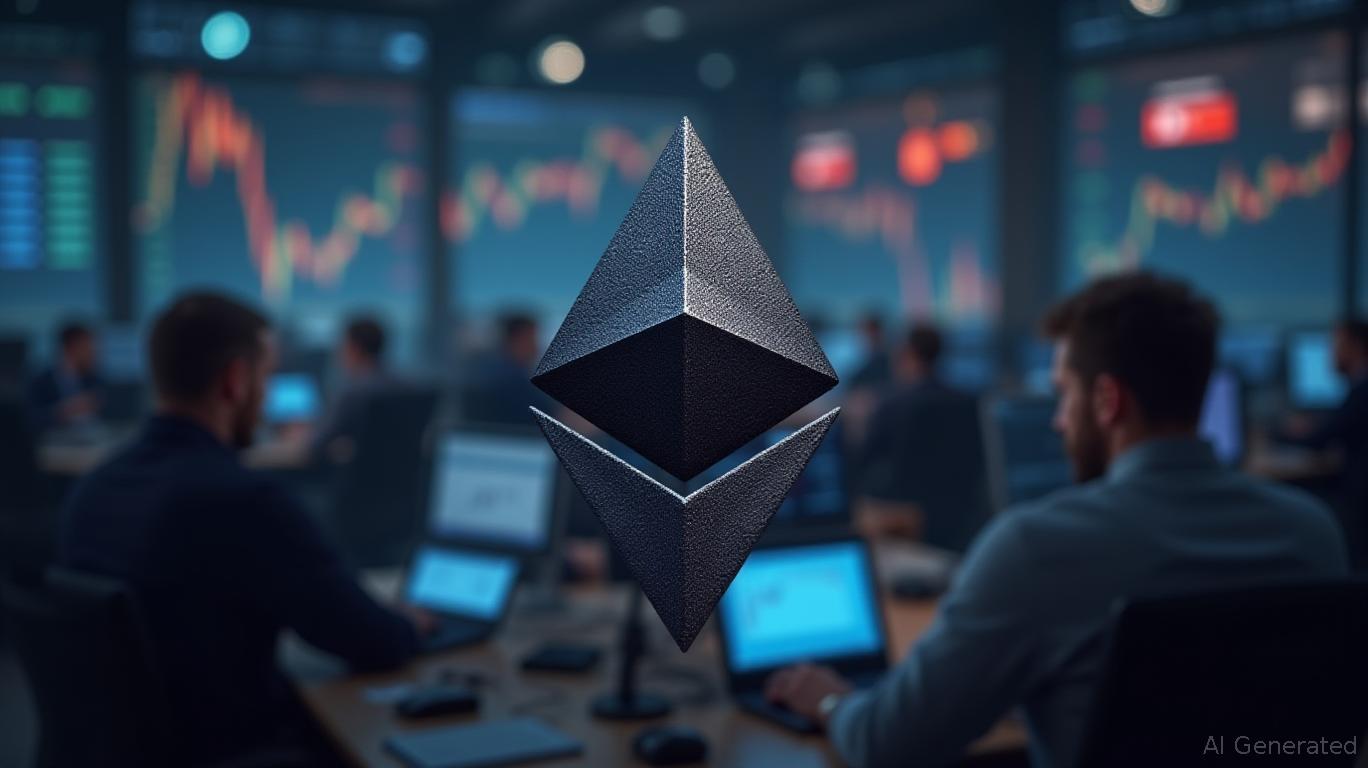MiCA-Compliant EURAU Connects Conventional and Blockchain Financial Systems Through Chainlink-Enabled Cross-Chain Growth
- EURAU, a MiCA-compliant euro stablecoin backed by Deutsche Bank and DWS, now supports cross-chain transactions on Ethereum, Solana, and five other major blockchains via Chainlink's CCIP. - The expansion enables zero-slippage transfers between networks, addressing liquidity fragmentation while maintaining 1:1 euro parity through a burn-and-mint model and segregated euro reserves. - Targeting institutional use cases like B2B payments and treasury management, EURAU's multichain strategy aligns with Europe's
AllUnity, with backing from Deutsche Bank and DWS, has broadened the reach of its euro-backed stablecoin EURAU to enable cross-chain transfers on leading blockchains such as
Backed entirely by euro reserves kept in separate accounts, EURAU is designed for institutional applications such as business payments, treasury operations, and on-chain settlements. AllUnity’s CEO, Alexander Höptner, stated that integrating CCIP “enables EURAU to function smoothly across several blockchains,” making it more practical for corporate users, Cointelegraph reported. The stablecoin’s rollout on six prominent blockchains, with future plans to add the Canton Network—a blockchain focused on institutional finance—further strengthens its position in the tokenized finance space, according to

According to Coinotag, the MiCA-compliant stablecoin received approval from Germany’s Federal Financial Supervisory Authority (BaFin) in July 2025, allowing its launch under strict rules that require frequent audits and transparent reserve oversight. This regulatory approval is vital as the EU encourages euro-based stablecoins to lessen dependence on dollar-centric systems. EURAU’s robust infrastructure is underpinned by Deutsche Bank’s $1.647 trillion balance sheet and DWS’s €1.01 trillion in managed assets, lending credibility to its international payment functions, Cointelegraph reported.
Chainlink’s CCIP uses a burn-and-mint mechanism to maintain 1:1 parity and consistent supply across chains, addressing a major hurdle in multi-chain stablecoin management. By adopting the Cross-Chain Token (CCT) standard, EURAU ensures transfers occur without slippage, a crucial feature for institutional users who require transaction accuracy, as explained in AllUnity’s announcement. The protocol’s security is further reinforced by Chainlink’s history of handling billions in cross-chain transactions, according to Coinotag.
This expansion reflects broader trends in Europe’s fintech landscape, where regulated stablecoins are increasingly viewed as foundational to tokenized assets. For example, Swiss crypto platform Relai recently obtained a MiCA license, and Circle’s
With EURAU’s adoption on the rise, AllUnity is emerging as a significant force in the shift toward tokenized finance. The stablecoin’s capacity to connect both public and permissioned networks—like the Canton Network—highlights its potential to optimize B2B payments and treasury processes for businesses, Coinotag observed. Supported by Chainlink’s infrastructure, EURAU’s multichain approach could speed up blockchain integration into conventional finance, especially within Europe’s regulated markets.
Disclaimer: The content of this article solely reflects the author's opinion and does not represent the platform in any capacity. This article is not intended to serve as a reference for making investment decisions.
You may also like
Connecting Conventional Finance and DeFi: Ondo and Chainlink Establish Standards for Institutional Tokenized Assets
- Ondo Finance partners with Chainlink to standardize tokenized assets for institutions via CCIP cross-chain interoperability. - Chainlink's institutional-grade data feeds enable real-time pricing and corporate action tracking for 100+ assets on Ondo's $300M TVL platform. - The collaboration bridges DeFi and traditional finance by enabling composable tokenized assets across 10 blockchains and institutional ecosystems. - Despite short-term ONDO token volatility, the partnership aligns with growing instituti

Hyperliquid News Today: IPO Genie: Making Equity Accessible to All or Just Adding to the FOMO Craze?
- IPO Genie ($IPO) emerges as a crypto market focal point, targeting retail investors post-BlockDAG/Toncoin volatility. - The project blends DeFi with IPO frameworks, tokenizing pre-IPO shares to democratize private equity access. - Rapid 300% liquidity growth and 50k+ Telegram members highlight rising interest, but regulatory risks and lack of transparency fuel skepticism. - Critics warn of FOMO-driven hype without real-world adoption, while venture capital interest raises compliance challenges.

Bitcoin Update: 17 Years Later: Bitcoin’s Endurance Sparks $150K Optimism Despite Market Volatility
- Bitcoin's 17th anniversary sparks global debate on crypto's future, with officials and leaders praising its resilience. - Price forecasts like Saylor's $150K target highlight optimism amid volatility, driven by regulatory progress and institutional adoption. - Geopolitical shifts, including Trump-Xi talks, temporarily boosted Bitcoin as investors anticipated trade de-escalation. - Controversies like the $TRUMP memecoin crash and Bybit hack tested trust, while Tether and Coinbase expanded influence throug

Ethereum Updates Today: Comparing Ethereum's Consistency with MoonBull's 9,256% Presale Surge: Navigating Crypto's Balance of Risk and Reward
- Ethereum (ETH) hits $4,075.89 in October 2025, driven by DeFi growth and scalability upgrades, despite regulatory risks. - Hedera (HBAR) surges 17.04% monthly amid Nasdaq's first HBAR ETF launch, but faces bearish technical indicators and potential $0.15 pullback. - MoonBull ($MOBU) dominates presale with 9,256% ROI projection, viral referrals, and 60-minute claim safeguards, raising $500K from 1,600+ holders. - Market trends highlight crypto's duality: institutional adoption boosts Ethereum/Hedera while
